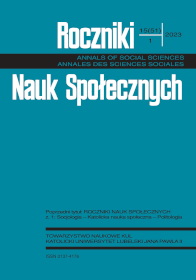POSTULAT INTEGRACJI WIEDZY A PORZĄDEK SPOŁECZNY W TEORII SYSTEMÓW AUTOPOJETYCZNYCH NIKLASA LUHMANNA
THE POSTULATE OF KNOWLEDGE INTEGRATION
VS. SOCIAL ORDER IN NIKLAS LUHMANN’S AUTOPOIETIC SYSTEMS THEORY
Author(s): Jarosław CharchułaSubject(s): Social Theory, Sociology of the arts, business, education, Social Norms / Social Control, Sociology of Education
Published by: Towarzystwo Naukowe KUL & Katolicki Uniwersytet Lubelski Jana Pawła II
Keywords: Niklas Luhmann; social systems theory; interaction; social order;
Summary/Abstract: The purpose of this article is to reconstruct the contribution that the general theory of social systems formulated by Niklas Luhmann has made to the integration of the diversity of social research. In this context, the theory has yielded methodological results, providing a basis for the orientation of social research, thus ensuring a significant degree of consistency in its development. This is especially significant in the context of increasingly diverse and specialized approaches in the social sciences, where the risk of disconnection, isolation and dispersion has become increasingly apparent. Luhmann defines a system not by the distinction between an element and a relation, as in traditional approaches, but by the difference between a system and its environment, which is the condition for the existence of systems in general, including social systems. The starting point of any system-theoretical analysis is the difference (differentiation) between the system and its environment. Systems are structurally oriented to their environment and without their environment they cannot last. They constitute and maintain themselves by producing and sustaining differentials to the environment. Without differentiation toward the environment, there would not even be self-reference.
Journal: Roczniki Nauk Społecznych
- Issue Year: 51/2023
- Issue No: 1
- Page Range: 109-121
- Page Count: 13
- Language: Polish

